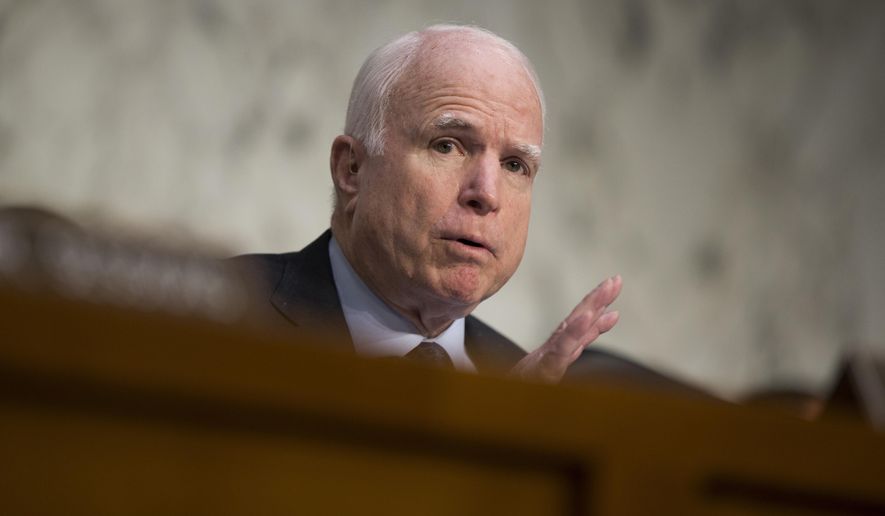Sen. John McCain threatened Thursday to compel Apple CEO Tim Cook to testify again about the company’s use of encryption as Congress continues to consider the consequences of allowing smartphone users to communicate under the radar of authorities.
Mr. McCain, Arizona Republican, issued the warning during a Senate Armed Services Committee hearing on cybersecurity where lawmakers and witnesses weighed in on digital encryption amid a lingering debate that intensified earlier this year when investigators were initially unable to recover data from an iPhone owned by suspected terrorist Syed Farook.
The Apple CEO was invited to attend Thursday’s session but chose not to appear, prompting Mr. McCain to acknowledge that the committee “has subpoena power” that could be invoked if lawmakers decide to have him testify on the topic.
“This is unacceptable,” Mr. McCain, the committee chair, said of the Apple exec’s failure to appear. “This committee extended an invitation to Apple CEO Tim Cook to offer his perspective on these important issues. He declined. I hope he will reconsider in the future so that this committee can benefit from the widest possible variety of perspectives.”
Mr. Cook, who testified in February about Apple’s use of encryption before investigators were able to compromise Farook’s iPhone by obtaining the services of third-party hackers, said at the time that the FBI had asked Apple to “hack our own users and undermine decades of security advancements that protect our customers”
Mr. Cook accused lawmakers of attempting to establish a precedent that he said “would undermine the very freedoms and liberty our government is meant to protect.”
Despite the FBI being eventually able to access the contents of Farook’s iPhone, Mr. McCain said Thursday “there’s an urgency” still to resolve the encryption conundrum, and that security measures such as those used by Apple make it difficult for investigators to do their job.
“Encryption is eroding the digital advantage our national security and intelligence officials once enjoyed,” Mr. McCain said. “Encryption is now ubiquitous across the counterterrorism fight — providing an avenue for recruitment and radicalization, as well as the planning and coordination of attacks that poses an increasingly difficult challenge to intelligence collection, military operations and law enforcement.”
The senator added that “meeting all efforts to reach a middle ground with absolute resistance, as too many tech companies have done” was no longer an option in the encryption debate.
Mr. McCain’s decision to revive the discussion occurred in the wake of a news report this week suggesting a bipartisan anti-encryption proposal offered by his colleagues earlier this year had likely died. The legislation, offered by Sens. Dianne Feinstein, California Democrat, and Richard Burr, North Carolina Republican, would have forced tech companies to decrypt communications upon the demand of law enforcement.
Speaking to McClatchy, however, Brooking Institution cybersecurity expert Susan Hennessey said the possibility of passage was as good as gone.
“It would be very, very surprising if the bill was introduced anytime in the near future — if at all,” she said.
In the House, meanwhile, lawmakers announced Wednesday that they had established a new caucus with the goal of ensuring Congress doesn’t subvert the Constitution’s protection from warrantless searches and seizures in the digital realm.
“Our founding fathers crafted the Fourth Amendment to withstand the test of time and protect our fundamental right to privacy, but they never could have anticipated today’s world of smartphones and connected cars,” Rep. Ted Lieu, California Democrat and House Fourth Amendment Caucus founding member, said in a statement.
• Andrew Blake can be reached at ablake@washingtontimes.com.




Please read our comment policy before commenting.